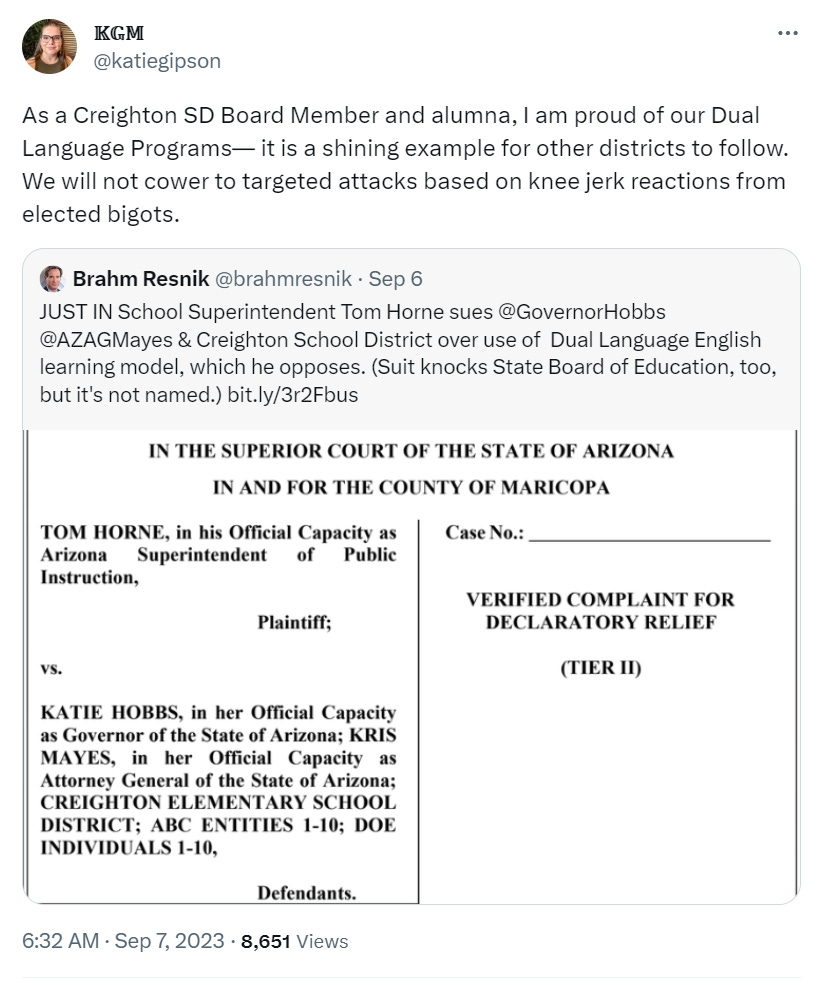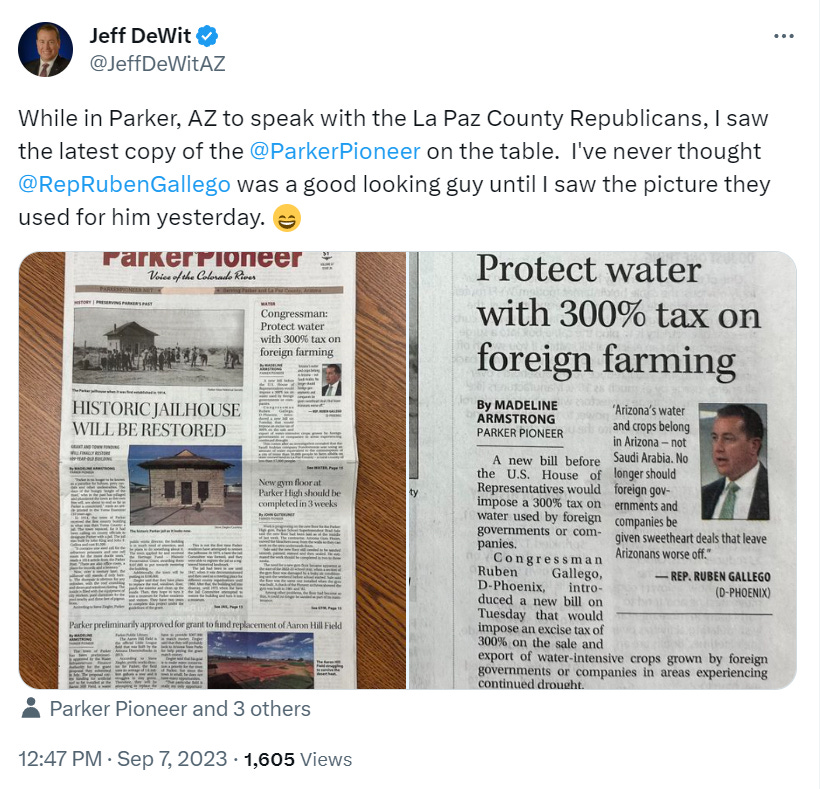The Daily Agenda: Tom Horne is right
Yet so terribly wrong ... It's a good time to have a kid ... And Jen don't work here no more.
If you’re going to learn a new language, everyone knows that immersion is the best way to do it.
So it’s easy to understand why in 2000, amid an “English-only” education movement that dovetailed with a creeping anti-immigrant sentiment, Arizona voters overwhelmingly took to the idea of teaching English to the state’s many Spanish-speaking students through “structured English immersion” classes. More than 60% of voters that year backed Prop 203, which promised to teach students English “as rapidly and effectively as possible” through the time-tested method of immersing them in the language.
And it can be tough to explain why the lawsuit that Superintendent of Public Instruction Tom Horne filed Wednesday against the Creighton Elementary School District attempting to enforce that English-only law — and end the dual-language classes that district has propped up to replace immersion classes — is such a bad idea.
But immersion classes aren’t what they sound like.
Arizona’s version of English immersion corrals non-English speakers together for up to 80% of their school day, siloing them off from other students. Instead of being surrounded by English-speaking peers in normal math or history or literature classes, English learners are packed into one class full of other kids who speak Spanish, with just one teacher doing the “immersion.”
It’s not students getting immersed in English. It’s a teacher getting immersed in Spanish.
Meanwhile, being stuck in “immersion” class for hours per day prohibits English learners from taking the other mandatory classes they need to graduate high school.
Back in the Spring of 2019, Hank spent some time in an English immersion class in Tucson’s Sunnyside School District. The students hated it. They wanted to be taking electives like art or photography, or just the classes they needed to graduate. Many of them had to attend summer school — not because they had flunked a mandatory class, but because they couldn’t even take the mandatory class since they were stuck in immersion for four hours per day.1
They wanted to be a part of their school’s community, but they couldn’t do that when the only other faces they saw for most of the day were fellow English learners.
Even the teacher knew the kids were getting screwed.
“I just think they’re being cheated out of other experiences and opportunities,” John Rodriguez, a teacher at Sunnyside High, told us at the time. “One, they don’t get the classes they need. Two, they lose out on the practice they need because they would be forced to acquire the language at a faster rate in classes with English speakers.”
Ironically, the dual language classes that Horne is attempting to kill off are actually much more immersive. Students receive instruction in both languages, and help each other understand the one that’s not native to them. And it’s far less intimidating and embarrassing for a student to speak a new language if the student sitting next to them is trying to learn your language, too.
Even under the “English only” law, parents can seek a waiver to allow their kids to take a dual-language program instead, assuming the school offers one (and because of the law, many don’t). But the process is complicated, and each waiver requires individual approval from both the local principal and the local superintendent. And of course, the waiver form on the Arizona Department of Education website is only available in English.
Unfortunately, Horne is probably right about the law. Because Arizona’s structured English immersion program was approved by voters, only voters can scrap it. And they haven’t done that.
Instead, lawmakers found a clever workaround to allow dual language classes for English learners amid a moment of bipartisan agreement on the topic in 2019 — that’s essentially what Horne is challenging. But lawmakers never worked up the political courage to send the whole law back to the voters, despite some attempts from Republicans to do so.
Now, with Horne in office, that brief window of opportunity seems to have closed. Horne is taking his shot in court, and may successfully reinstate the hardline immersion policies that academics, teachers, students and even Republican lawmakers agree do not work.
For more than 20 years, Arizona has been doing structured English immersion. And for more than 20 years, we’ve been failing English learners. The most recent test results show only 9% of English learners are proficient. Nearly a third of them are “long-term English learners” who have failed the proficiency test for five or more years, despite the immersion law’s goal of graduating students out of the program in one year.
Horne may be right about the law. But he’s wrong about the policy.
Go have babies!: Gov. Katie Hobbs announced her administration created a paid parental leave pilot program for state employees. Previously, new parents were not given paid parental leave and had to take unpaid FMLA time off. Now, new parents, including new adoptive or foster parents, will receive 12 weeks of paid parental leave. The policy was part of Hobbs’ plan for her first 100 days in office and is backdated to include anyone who had a baby since Hobbs took office. Additionally, the state removed the 40-hour cap on the amount of sick leave employees can use to care for a parent, spouse or child. The new cap is 480 hours.
Not-so-woke cops: Despite having a LGBTQ+ liaison, advisory committee and near perfect score from the Human Rights Campaign when it comes to policing, Flagstaff police misgendered, dead-named and cited a trans woman for felony assault for what she described as defending herself from sexual assault with bear mace, Lookout’s Joseph Jaafari reports after dredging up the officers’ probable cause statement, which was 27 pages with only one paragraph dedicated to her side of the story.
“County prosecutors rely on probable cause affidavits written by police to determine if an arrest was warranted. With only one side of the story told in the affidavit, it’s unclear if the county attorney knew that Rose claimed that the men initially sexually assaulted her,” Jaafari writes.
Hard job to fill: After everyone who knows how to run elections quit in Pinal County, supervisors are finally nailing down the county’s plan for next year’s elections, which includes putting new County Recorder Dana Lewis partially in charge of hiring a new elections director, the Republic’s Sasha Hupka writes. The previous elections director resigned in a memorable “no regrets” sendoff letter. While two supervisors will be embedded in the recruitment and hiring process, and all supervisors will ultimately have to vote on the new hire, the new plan does not allow county political parties any role in the hiring process, as previous drafts had considered.
He was as surprised as anyone that it worked: State Senate President Warren Petersen sat down with KJZZ’s Mark Brody on “The Show” to talk about budgeting in divided government and his caucus’ victories, including on repealing the rental tax and passing a tax rebate. He said the personal slush fund budgeting scheme that lawmakers used this year was wildly successful, but it may be a one-time tool.
“Outside of some of our election integrity initiatives, we really accomplished everything we set out to do,” he said.
We also accomplished most of our goals this year, and we did it all without a slush fund! But a slush fund would make it a lot easier…
Seems legit: The Goldwater Institute is suing the state in an attempt to force statewide retention elections for appeals court judges, rather than elections in their own divisions, the Republic’s Jimmy Jenkins writes. Andrew Gould, the former Arizona Supreme Court justice turned 2022 AG candidate, authored the filing for Goldwater arguing that the current system disenfranchises voters because a judge in the other division (there are two divisions) may be the one who decides a case of statewide importance that affects them, and they’ll never have a say in that judge’s retention election. However, the case was thrown out yesterday because the former Supreme Court justice had some technical drafting errors.
Bad options abound: As the City of Phoenix continues to sweep streets in the Zone, KJZZ’s Kirsten Dorman and Tori Gantz spent some time talking to residents about what it’s like to be forced out of the makeshift homes they’ve created and the community they’ve found there.
“I don’t want to stay here,” a resident who goes by Queball told them, “but I don’t want to leave under a forced hand.”
And they can’t go to the Zone: Evictions in Maricopa County spiked last month to the third-highest number of all time: 7,693 eviction cases were filed in the Valley last month. 12News’ Kyra O’Connor reports that the only time there were more evictions than that was back in the summer of 2005.
If you’re searching for an attorney who will tank your case by getting the very basic facts wrong, former Cyber Ninjas/Kari Lake lawyer Bryan Blehm has you covered.
Blehm’s losing record is almost unmatched in this state, and his taste for fantastical allegations has gotten him sanctioned by the courts.
But his latest rant against reporter Jen Fifield — where he urged his followers to unsubscribe to the Republic, even though she doesn’t work there — gave us a real chuckle.
It’s unlikely that any of Blehm’s online followers subscribe to the Republic, but if the number of subscribers to the state’s largest daily suddenly plummets, blame Jen.
Lawmakers reduced the required block of time that English learners spent in immersion classes from four hours to two after that year.










With the caveat that I am not by any stretch of the imagination an attorney: I really don't understand the logic behind the argument that appellate judges should be elected statewide because their decisions affect the whole state. Can't the same thing be said about legislators, especially those who are in key positions like the Senate president? I know the analogy isn't perfect, but still, the whole idea of having local elections is to make sure that different parts of a larger entity have a say, rather than having the majority control everything.
Hank, you're granting the Superintendent too much facial validity. The key language from Proposition 203 comes from the Findings and Declarations (Section 1):
"6. Therefore it is resolved that: all children in Arizona public schools shall be taught English as rapidly and effectively as possible.
"7. Under circumstances in which portions of this statute are subject to conflicting interpretations, these Findings and Declarations shall be assumed to contain the governing intent of the statute."
So the purpose of initiative is for children to learn English, and that's explicitly granted interpretive authority as to the people's intent. Plausibly, the state supreme court could rule in favor of Horne. But it could also rule that given research published in the last quarter century strongly in favor of dual-language immersion, the 2019 statute eliminating 4-hour SEI and the 50-50 option approved by the Board of Education does advance Finding/Declaration #6. We just don't know now.